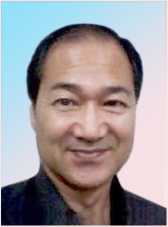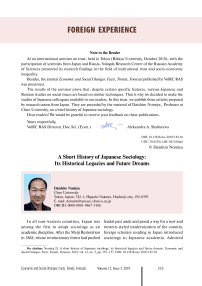A short history of Japanese sociology: its historical legacies and future dreams
Автор: Nomiya Daishiro
Журнал: Economic and Social Changes: Facts, Trends, Forecast @volnc-esc-en
Рубрика: Foreign experience
Статья в выпуске: 5 (65) т.12, 2019 года.
Бесплатный доступ
ID: 147224211 Короткий адрес: https://sciup.org/147224211
Текст ред. заметки A short history of Japanese sociology: its historical legacies and future dreams
Aleksandra A. Shabunova
UDC 316(520), LBC 60.5(5Jap)
A Short History of Japanese Sociology: Its Historical Legacies and Future Dreams

Daishiro Nomiya
Chuo University
Tokyo, Japan, 742-1, Higashi-Nakano, Hachioji-city, 192-0393
first were sociological predecessors, such as H. Spencer and A. Comte. Spencer, for example, was well received among Japanese intellectuals, as his theory of the evolution of society appealed well to both public intellectuals and political and industrial leaders in Japan, who firmly believed that Japan would soon catch up with the Western societies and become a military and scientific giant. Thus, sociology in the 19th century Japan functioned as an intellectual mechanism to acknowledge the governmental policy to push Japan to an western-styled modernized country [1].
Entering into the 20th century, the Japanese intellectual expanded its wing, adopting a more and varied genre of sociology from abroad. G. Simmel, F. Tonnies, and. R.M. MacIver were successively introduced to Japanese academia, exposing what we call today formal sociology to the Japanese intellectuals. Also in this period, sociologists in Japanese began to organize themselves, as the Japan Sociological Academy, predecessor of the present Japanese Sociological Society, was established in 1913 [2, p. 237].
During the later years in the first half of the 20th century, formal sociology began to be criticized of its very abstract nature, giving Marxian sociologists and advocates of German cultural sociology a way to promote the study of the state and classes in more concrete terms. Along with this movement came a new strategic change in the study of sociology: introduction of empirical and positivistic sociology. In this period, studies of family, and rural society as well as urban society were in full bloom, all based on the data collected from empirical research. These studies lay the groundwork for current family sociology as well as rural and urban sociology in Japan. Introduction of Durkheim, especially his spirit of empirical rigor, to Japanese academia in this period may have pushed this trend further [2, pp. 238–239].
Post-war period Japan witnessed another unfolding of sociology as a discipline. As an academic institution, sociology saw further development in its organizational structure. The establishment of the Japanese Sociological Society in 1950 along with successive publications of introductory books and texts, which was fostered by the rapid expansion of courses in sociology in many Japanese universities, set the tone for this trend. It was not an institutional expansion only that was prevalent in the post-war Japan. Post-war rapid socioeconomic development pushed Japanese sociologists to study the social development and associated societal change and social problems. Assisted by an avid import of American sociology, theories of modernization, social stratification, economic sociology, communication, social psychology as well as other subareas of sociology were in full bloom, giving sociology an impression of collected stature of many subdivided areas. Theories of sociology were also introduced from one after another; functionalism, conflict theory, exchange theory, symbolic interaction, phenomenological sociology, critical theory, ethnomethodology provided an array of foundations for further sociological endeavor. All in all, these expansions have led us to what we have as Japanese sociology today [2, pp. 243–245].
It is true that Japanese sociology started from the import of Western sociology. As seen above, however, Japanese sociologists have exposed themselves to an array of sociological theories and practices. This incorporation of varied sociological traditions has laid the foundation for the development of Japanese sociology, especially in its effort to enrich sociological ideas and imaginations by linking multiple strands of thoughts and perspectives. We have seen this practice time and again in Japanese scholastic work, for example, in such areas as sociology of family, rural society, social stratification, and social movements.
This nature of Japanese sociology also helped us to cooperate and extend dialogue with sociologists abroad. The Japanese Sociological Society was among the founding members when the International Sociological Association was established in 1948. As early as 1973, Japan orchestrated an academic movement to establish the Asian Sociological Society, which lasted up until 1996 [3].
Entering in the 21st century, Japanese sociology continues to play its distinctive role, working for further interaction of sociologists on a global scale. In 2014, Japan invited the World Congress of the International Sociological Association. Also in 2019, Japan organized an inaugural congress of the East Asian Sociological Association (EASA). EASA is an end product of a longstanding effort by sociologists from the East Asian countries to foster academic cooperation among them [4].
Japanese sociology has benefitted greatly from its Western predecessors. Now it is her turn to provide all she has, from theoretical pursuit and empirical knowledge, to other sociologists from around the world who are eager to work together and cooperate with Japanese sociology. It is our belief that our effort to put together sociologists from different societies will eventually help us all for the betterment of our societies, and the world.
Список литературы A short history of Japanese sociology: its historical legacies and future dreams
- Shinnmei M. General Introduction of the History of Sociology. Iwanami Publisher, 1954.
- Sakuma T. History of Modern Sociology. Soufuu-sha, 1990.
- Yazawa S. Five meanings of 18th World Congress of Sociology: from historical perspective. Shakaigaku-Hyoron, 2014, no. 65 (3), pp. 317-326.
- Nomiya D. Building a New Academic Horizon: a Challenge from East Asia. 19th World Congress of Sociology, Toronto, Canada, 2018.


